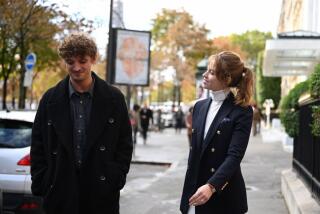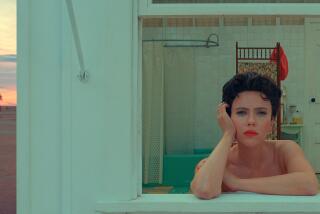Moreau at Her Best in ‘Bay of Angels’
- Share via
Of all the performances that have made Jeanne Moreau revered among actresses, her work in “Bay of Angels” is one of the most compelling and one of the least seen.
Directed in 1963 by Jacques Demy, “Bay of Angels” has been unavailable theatrically in this country for nearly 40 years. But a new 35-millimeter wide-screen print has been struck, and this celebrated film is once again open for business, playing at the Nuart in West Los Angeles for one week.
This was only the second feature for writer-director Demy, one of the more underappreciated of the French New Wave directors, and, right from its bravura opening, the film’s intense tone couldn’t be more different from the lighter romanticism that characterized “Lola,” his debut, and his later “The Umbrellas of Cherbourg.”
That credit sequence starts with a close-up of Moreau’s face in an iris circle. Then the image widens to fill the screen and the camera, likely mounted on the back of a car, suddenly pulls away from her, briskly and vertiginously swooping backward for more than a minute as it travels along the boardwalk paralleling the bay in Nice that gives the film its name.
The subject of “Bay of Angels” is gambling. Not as a way to pass the time or make a little money, but gambling as a compulsion as powerful and seductive as love, a drive so strong it literally functions as a reason to live.
Because “Bay of Angels” reveals rather than moralizes, because its concerns are character and psychology, it’s a potent showcase for Moreau’s gifts. Her Jackie Demaistre is a mesmerizing, compulsively watchable performance, one of the few films roles you literally hold your breath watching. To quote a bowled-over Pauline Kael, “the picture, almost an emanation of Moreau, is inconceivable without her.”
Before we meet Moreau’s Jackie, we are introduced to Jean Fournier (a cool and effective Claude Mann), a Parisian bank employee. He hasn’t given gambling a thought until a friend takes him along to a casino. Suddenly, he’s won half a year’s pay in less than an hour at the roulette table, and he has the fever. His father is disgusted, but Jean is convinced that his head is not going to be turned, that his feet are firmly on the ground. That’s when he meets Jackie.
Impeccably dressed in a chic white Pierre Cardin suit, compulsively smoking and constantly pushing back her thick, dyed blond hair, Jackie is a mystery that can never be solved. Intelligent, passionate, with a gaze so intense it is all but intoxicating, Jackie is committed, body and soul, to placing her bets.
“The happiness gambling gives me,” she says, “can’t be compared to any other.” She’s drawn not to the money, but to the action, to the “stupid mixture of luxury and poverty” that seems to be the gambler’s life. The first time she entered a casino, she says, “I felt like I was in a church.” Having sacrificed a wealthy husband and a young child to her religion, she has no intention of stopping.
Jackie and Jean make an incendiary pair. She introduces him to a lifestyle he never knew existed, to exhilarating highs of wealth and the debilitating lows of being tapped out. Jean falls in love with her--it’s inconceivable that anyone wouldn’t--but Jackie is not exactly inclined to settle down. In her suitcase, for instance, is a miniature roulette wheel that she keeps in reserve for the times when she has no money for casinos. She’s happily played alone, she says, for days.
Aside from Moreau’s incandescent performance and the writing and directing that made it possible, “Bay of Angels” benefits enormously from the contributions of Demy’s collaborators, starting with cinematographer Jean Rabier, whose crisp, indelible blacks and whites seem to have a vivid life of their own.
“Bay of Angels” also elicited one of the best scores of Michel Legrand’s long and varied career. When the action at the roulette wheel heats up, when Jackie and Jean start to gamble with true abandon, it’s Legrand’s propulsive music that helps us feel the exhilaration, the sense of giving yourself to the glories of the moment, that we often hear about in gambling films but rarely get to share.
*
Exclusively at the Nuart Theater, 11272 Santa Monica Blvd., West L.A., (310) 478-6379.
More to Read
Only good movies
Get the Indie Focus newsletter, Mark Olsen's weekly guide to the world of cinema.
You may occasionally receive promotional content from the Los Angeles Times.











